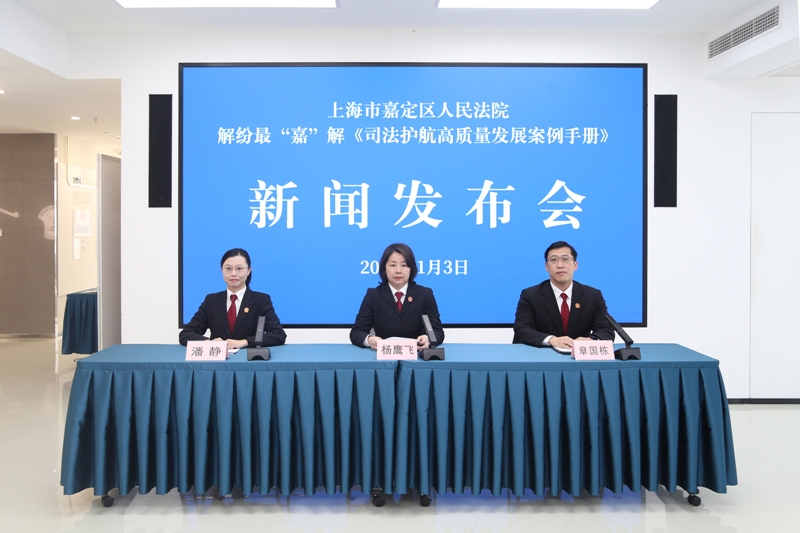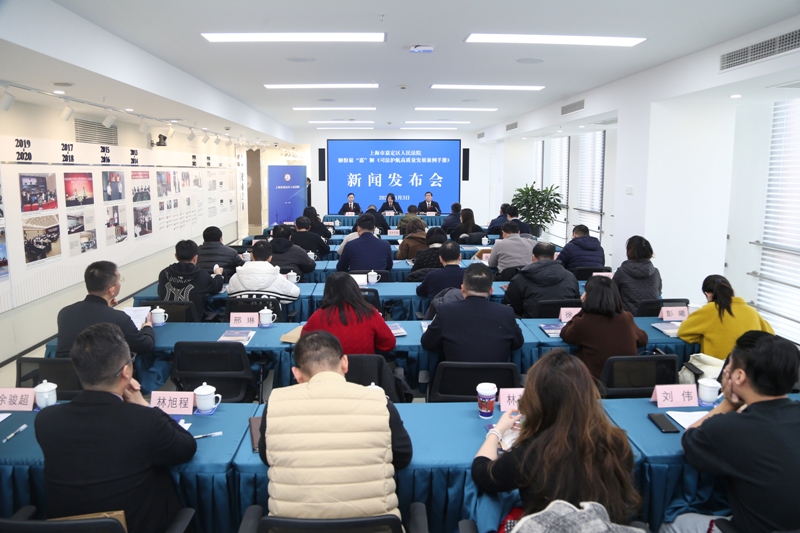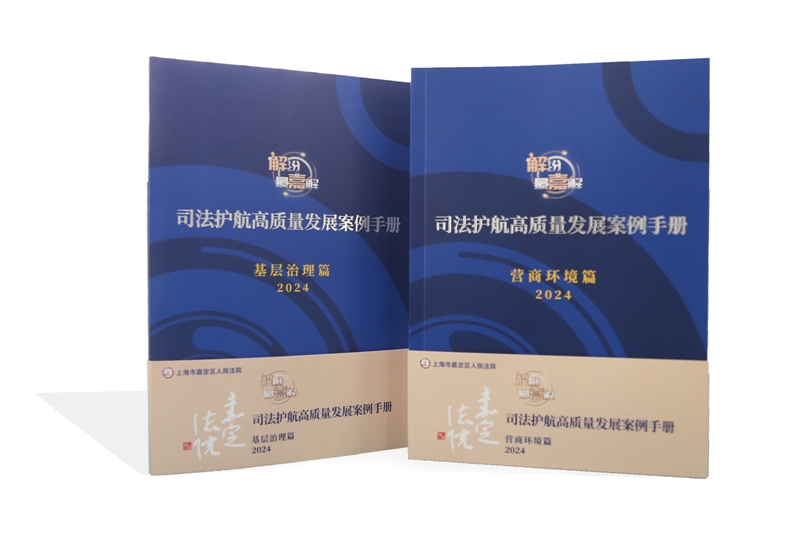
 Your current location >> Press Release
Your current location >> Press Release



Are homeowners entitled to refuse the payment of property fees
if the charging criteria change? Can a party in a divorce who previously waived
custody later seek to regain custody? What should companies be cautious of when
providing external guarantees? How can individuals quickly find optimal
solutions to these everyday legal issues?
On January 3, 2025, Shanghai's Jiading District People's Court
(hereinafter referred to as "Jiading Court") held a press conference
and released the Optimal Solutions to Disputes: Judicial Service-Enabled
High-Quality Development Casebook. The event aimed to fully implement the
spirit of the 20th National Congress of the Communist Party of China (CPC),
harnessing the power of the rule of law to strengthen the foundational framework,
stabilize public expectations, and promote long-term development. The
initiative seeks to enhance the role of judicial adjudication in guiding public
values, regulating behavioral norms, and addressing the most direct, practical,
and relevant concerns of the people. Additionally, it provides valuable
insights for decision-making in grassroots social governance and the
development of the regional business environment. The press conference was
attended by deputies to the National Congress of the CPC, members of the
Chinese People's Political Consultative Conference, leaders from Jiading
District Judicial Bureau, Housing Security and Management Bureau, and relevant
Party committee offices and bureaus, as well as officials from 13 departments
including the Jiading District Publicity Department, Society Work Department,
the Political and Legal Affairs Commission, and Development and Reform
Commission. Representatives from various enterprises, villages, and communities
also participated in the event. The press conference was chaired by Yang
Yingfei, the spokesperson of and director of the Political Department of
Jiading Court.
This event marked the first session in a series of press conferences organized by the Shanghai Courts, titled Promoting Justice and Setting an Example — Advancing the Modernization of Shanghai Courts' Work.
At the conference, Zhang Guodong, a member of the Party
Leadership Group and vice president of Jiading Court, briefed on relevant
aspect of the initiative. As one of the brands of the Jiading Court, the
"Optimal Solutions to Disputes" is dedicated to conducting
fundamental resolution of conflicts and disputes by addressing root causes and
providing meaningful solutions. The newly released Judicial Service-Enabled
High Quality Development Casebook is one of the achievements of this
brand. Its purpose is to prevent disputes before they arise and promote good
governance by diagnosing "existing issues" and prescribing
"effective remedies". The casebook focuses on two major themes:
"Grassroots Governance" and "Business Environment". It
addresses common disputes in areas such as marriage and family inheritance,
neighborhood issues, property management, homeowners' committees, grassroots
self-governance organizations, corporate governance, business operations,
intellectual property, employment, and more. A total of 64 typical cases have
been carefully selected across five categories of cases: civil, commercial,
intellectual property, criminal, and enforcement. These cases are grouped into
two sections of the casebook: "Grassroots Governance" and
"Business Environment".
As a collection of cases intended to popularize laws, the
casebook presents abstract legal provisions through real cases, transforming
the spirit of rule of law and legal principles into justice that can be
tangibly perceived by the masses. This is a proactive exploration of the
people's courts to "promote governance and solve problems through civil
and commercial trials". The casebook integrates "extensive" case
selection, "vivid" case analysis, and "realistic" case
writing.
II. "Vivid" case analysis. With a lively and engaging narrative style, real cases are portrayed in a story-like and plot-driven format to enhance readability. On one hand, these cases are presented as "problems", succinctly summarizing the key disputes in the case, allowing readers to quickly grasp the critical points. On the other hand, the case study from diverse angles not only explains the legal principles but also delves into social phenomena, governance challenges, and the behavioral characteristics of the parties involved. This approach helps the public develop a deeper understanding of legal issues from various perspectives and dimensions, raising awareness of laws and regulations and fostering a stronger recognition of the spirit of the rule of law.
III. "Realistic" case writing. The casebook is based on actual judicial practice, using simple language and concise phrasing to integrate case analysis with legal norms and judicial adjudication. It effectively communicates meaningful legal principles through vivid language. Each case analysis consists of four parts: an introduction, a summary of the case, governance or business recommendations, and relevant legal provisions. Starting with the core legal issues reflected in the key disputes, the case analysis precisely outlines the facts, explicitly sorts out the legal relationships, and thoroughly explains the essential points of the judicial decision. The analysis is supplemented by legal insights, governance recommendations, and business advice, providing a straightforward introduction to the legal knowledge and judicial rules, while clarifying the relevant legal norms and codes of conduct.
Ye Dan, a deputy to Jiading District People's Congress, and
secretary of the Party Committee of Shanghai Bullet Train Section of China
Railway Shanghai Group Co., Ltd.
Jiading Court has sorted out the most common issues in
grassroots governance, focusing on creating significant impacts through small
entry points. Fully leveraging the professional strengths, the court has combined
complex and obscure legal provisions with real-life cases involving disputes.
The collection of cases compiled by the court conveys specialized legal
knowledge and terminology in simple and easy-to-understand language. This
casebook not only provides strong support to grassroots committees and other
organizations in resolving conflicts but also serves as a model and offers
valuable resources for similar efforts by other people's courts. This
initiative is highly meaningful and deserves full recognition.
Huo Junjuan, a member of the Jiading District Political
Consultative Conference and director of Shanghai Huijun Lawfirm
The 32 cases related to grassroots governance address issues
closely tied to people's daily lives, including marriage and family matters,
neighborhood disputes, and property management. Through case-based legal
education and law popularization, these examples provide the public with a
clear and intuitive understanding of the effectiveness and compassion inherent
in law-based services. The 32 cases of business environment tackle common
challenges in corporate operations, including internal corporate governance of
equity rights, employment and human resources, external operations, and risk
control and compliance. These cases provide clear legal guidance and risk
warnings for business operators. The release of the Jiading Court casebook
represents a model for conflict resolution, identifying and promoting the
broader social value of judicial decisions. It injects vitality and momentum into
the modernization of grassroots governance.
Shen Huaqiang, deputy director and secretary of the Party
Committee of Jiading District Judicial Bureau.
The Business Environment section of the casebook provides
business advice through the interpretation of typical cases, integrating legal
analysis. The casebook delves into the big picture of the law-based business
environment based on small pivots, helping enterprises address visible problems
and avoid foreseeable risks. The Grassroots Governance section focuses on cases
related to grassroots governance, covering five types of disputes, such as
marital and family inheritance conflicts and neighborhood disputes. It provides
suggestion for governance, offer models for mediation work, serving as valuable
references for judicial practice.
The core principle of state governance remains the same:
benefiting the people is fundamental. Among the family affairs, national
affairs, and global matters, ensuring people for a happy life is a top
priority. The release of the casebook represents a valuable initiative by the
Jiading Court to elucidate significant legal knowledge in an engaging and
accessible way. This successful experiment reflects the court's commitment to
"explaining the law and promoting governance through cases".
Moreover, it highlights the courts' efforts to support grassroots governance
and fostering the development of a law-based business environment through
judicial services.
In the future, Jiading Court will further deepen its philosophy
of empathizing with the parties involved in litigation, placing equal weights
on case trial and social governance. The court will actively expand the role in
judicial adjudication, proactively press ahead with the protection of judicial
services, and constantly strengthen the provision of law-based services.
Additionally, the court will continue to innovate the grassroots mechanism of
law popularization, contributing judicial wisdom to improve the quality and
efficiency of social governance, optimize and upgrade the business environment,
and help create a brighter future for the people.
>> Chinese Version
